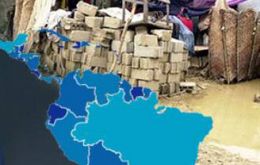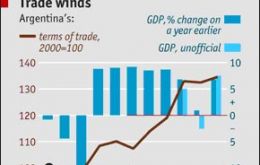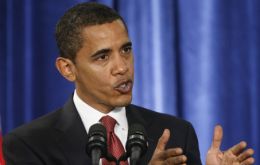MercoPress. South Atlantic News Agency
Tag: economy
-
Thursday, October 7th 2010 - 00:28 UTC
Uruguayan economy, second best performer in Latinamerica, forecasts IMF

The IMF expects the Uruguayan economy to expand strongly this year, 8.5% and 5% in 2011 in a world framework which is experiencing the slow consolidation of recovery but still highly vulnerable.
-
Wednesday, September 29th 2010 - 19:15 UTC
Latam forecasted to grow 5.5% to 6% this year, spurred by Mercosur members

World Bank's Chief Economist for Latin America and the Caribbean Augusto de la Torre said that the Latin American economy will grow between 5.5 and 6% this year spurred mostly by a good performance from Mercosur members.
-
Monday, September 20th 2010 - 04:25 UTC
Brazil’s post-election adjustment “won’t have much influence” on Uruguay

Uruguayan market analysts don’t believe Brazil’s attempts to prevent its currency from continuing to appreciate will have a relevant impact for Uruguay or for its foreign exchange rate.
-
Thursday, September 16th 2010 - 05:15 UTC
Uruguayan economy expands 9.8% in first half over last year

The Uruguayan economy continues to expand strongly having advanced 2.3% in the second quarter over the first quarter and 10.4% compared to a year ago and 9.8% over the fist half of 2009, according to the latest release from the Central Bank.
-
Sunday, September 12th 2010 - 07:29 UTC
A view from The Economist: ‘US and Latin America, nobody’s backyard’

Under the heading of “The United States and Latin America: Nobody’s backyard”, The Economist publishes one of its leading articles, supported by special pieces dedicated to the region’s potentialities, recent successes and shortcomings, mainly triumphalism and complacency.
-
Monday, August 30th 2010 - 07:10 UTC
Venezuela, only Latin American economy (together with Haiti) to contract in 2010

Venezuela's economy shrank 3.5% during the first half of 2010 compared to the same period a year earlier, the Central Bank said in a report that revealed a deep recession in the oil rich country ahead of September legislative elections.
-
Sunday, August 22nd 2010 - 03:05 UTC
The Economist on Argentina's economy: happy-go-lucky Cristina

Earlier this year, Cristina Fernández de Kirchner, Argentina’s president, proffered some advice to European governments facing recession and market panic. Its essence was “stuff the IMF and carry on spending.” It is what she and her predecessor and husband, Néstor Kirchner, have practiced since 2003. Argentina is one of only a handful of countries that refuse all dealings with the IMF. Almost a decade after it defaulted on $90 billion of debt when its economy collapsed, it still has few financial ties with the world and very little bank credit. Yet contrary to repeated forecasts of doom from orthodox economists, the economy is roaring.
-
Thursday, August 19th 2010 - 02:54 UTC
Over-supply of homes hindering US economic recovery says Obama

President Barack Obama has said an over-supply of homes is hindering the US economic recovery. Obama also said the US had to find a way to curb its budget deficit without further slowing economic growth.
-
Wednesday, August 18th 2010 - 04:28 UTC
China points out: second-largest economy but not second largest economic power

This week’s news that China had overtaken Japan to become the world's second-largest economy in the second quarter of this year made headlines around the world. The economic milestone was seen as a telling confirmation of the shifting balance of economic power in Asia, and as a culmination of China's stunning three-decade economic resurgence.
-
Tuesday, August 17th 2010 - 09:14 UTC
World Cup helped Magallanes region economy pick up in second quarter

Magallanes Region in the extreme south of Chile had a strong economic rebound in the first half of this year, boosted by the construction industry and retail sales, according to Chile’s National Statistics Office, INE.
